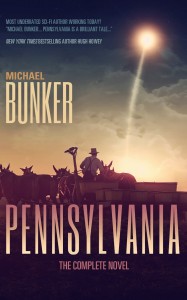Worldview and Michael Bunker’s PENNSYLVANIA
Sometimes I buy a book by a best-selling indie author just to see if I can figure out what made this particular story so popular. Part envy, part curiosity, part marketing research, I try to pick out what made this one stand out from all the rest.
Lots of times I end up shrugging my shoulders. Don’t get me wrong, these books are good—some are even great—but why did they take off?
When I heard Michael Bunker being interviewed on NPR a few weeks ago, I had to check it out. I bought a copy of Michael Bunker’s PENNSYLVANIA Omnibus, and by the time I had finished the first installment, I had my answer.
PENNSYLVANIA and Worldview
Pennsylvania is the story of Jed Troyer, an Amish man on the morning of his departure from the family farm–to another world. The current Earth has run out of affordable land for farming and the government has set up colonization on another planet. When Jed arrives in New Pennsylvania, after nine years in suspended animation, he finds a world torn apart by war between Transport (the government) and TRACE (the rebels).
Bunker leads the reader on a journey of twisting allegiances, space and time travel, and unique biological internet implants. All this is wonderful adventure and great characters, but what kept me turning pages was how Bunker’s worldview has shaped the story.
When Jed is forced to confront the “English” technology, he is more effective because he is “a pure Amish mind, flexible and resilient, systemically agnostic, and clear of technological biases..that was just what was needed at this moment.” In other words, he can think outside the box.
Bunker paints a picture of a people caught between warring factions, “who’d determine that they would define themselves, rather than have their reality and culture defined by the time.” For spoiler reasons, I won’t give away the plot, but the war turns Jed’s Amish worldview on its head, making him choose between his family and his values.
World what?
Worldview is the glue in the storytelling of PENNSYLVANIA.
Admittedly, since I’m midway through Jeff Goin’s Tribewriters course, I may be overly sensitized to the topic of worldview. As the name of the course implies, Goins teaches a course about finding the “tribe” for your writing online.
What is it? According to Goins, worldview is your perspective, your identity. It’s the why of what you do, and way more important that the how or the what. Worldview is the foundation of your writing voice and gives your prose the ring of authenticity.
I’d always thought of blogging as a niche endeavor, you find a little slice of knowledge and expand that into a following. Jeff’s take is different. He dismisses the idea of niche as the driving force behind a blog and asserts it’s about “worldview.”
The Author and the Message
The writer in me admires how Bunker has merged his personal ethics–his worldview, if you will–with his fiction. Yes, he is the creator of Amish science fiction, but I'm guessing he was an Amish man long before he started writing science fiction.
Is Bunker’s technology-wary, libertarian, live-off-the-land worldview too narrow? Yes, and that’s the point. Without a worldview, this would be just another good vs evil story, lost in a sea of anonymous gray. With his sharp worldview, Bunker transforms PENNSYLVANIA into the story into of one man, used to living simply, fighting against the unstoppable forces of technology.
And so, Mr. Bunker, the self-described “plain person,” uses his life experience to create Amish science fiction.
Authenticity in marketing, who’da thunk it?
David Bruns is the creator of the sci-fi series The Dream Guild Chronicles, and one half of the Two Navy Guys and a Novel blog series about co-writing the military thriller, Weapons of Mass Deception. Check out his website for a free sample of his work.


